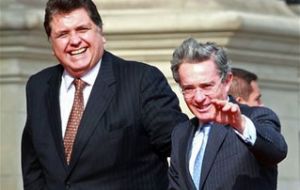MercoPress. South Atlantic News Agency
EU signs trade agreements with Central America and Peru and Colombia
 Peruvian president Alan Garcia and Colombian leader Alvaro Uribe
Peruvian president Alan Garcia and Colombian leader Alvaro Uribe The European Union on Wednesday signed trade agreements with Central America, Peru and Colombia, while some Latin American leaders criticized such deals as only favouring rich countries.
The agreements were signed at EU bilateral summits with Central America and the Andean Community in Madrid. The meetings followed the EU/Latin America and Caribbean leaders’ summit on Tuesday, which brought the representatives of 60 countries - including more than 30 heads of state or government - to the Spanish capital.
The EU association agreement with Panama, Costa Rica, Honduras, Nicaragua, El Salvador and Guatemala was its first such deal with Central America.
Negotiations had been interrupted after Honduran president Manuel Zelaya was ousted in a June 2009 coup, but resumed after Porfirio Lobo was elected Zelaya's successor in November.
Many Latin American countries do not recognize Lobo's legitimacy as president, leading him to stay away from Tuesday's summit. Lobo only attended the regional meeting at which the association agreement was sealed Wednesday.
The economic part of the accord gives EU car makers free access to the Central American market, allows Central America to export rice and beef to the EU for the first time, and cuts import tariffs on Central American bananas.
Peru and Colombia, meanwhile, signed trade agreements with the EU that increase market access for both sides, while also calling for cooperation and other measures to raise development level in the two Andean countries.
Colombian President Alvaro Uribe described his country's agreement as a “very important step,” but his Bolivian counterpart Evo Morales said his country would “never” accept a similar deal arguing it is based on “looting our natural resources.”
The Andean Community comprises Peru, Ecuador, Bolivia and Colombia. It initially launched joint talks with the EU, but divisions emerged between its members.
Ecuadorian President Rafael Correa announced that Quito will re-launch negotiations with the EU in June. The aim, however, would be an association rather than a trade agreement, he said.
“We believe in trade, but not in free trade” Correa said, describing the latter as favouring “the most competitive country”.
Bolivia’s Morales also spoke out on immigration Wednesday, saying wealthy countries “have the obligation” to receive immigrants because their “capitalism” system was responsible for the problems in developing countries.
Especially poorer immigrants need protection, he said.
Separately, the EU and the Andean Community pledged to join forces against drug trafficking and global warming.
Peruvian President Alan Garcia, whose country holds the Andean Community presidency, also urged wealthy countries to stop weapons sales to poorer nations.
Garcia had earlier criticized what he described as an “arms race” between Latin American nations.
The agreement must now be legally assessed and translated, a process expected to take several months. Then it must be passed by the European Parliament and Colombian and Peruvian Congresses before it comes into effect.




Top Comments
Disclaimer & comment rulesCommenting for this story is now closed.
If you have a Facebook account, become a fan and comment on our Facebook Page!